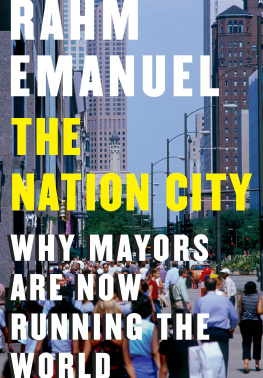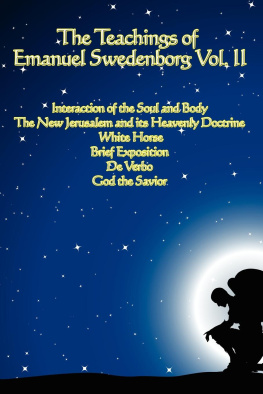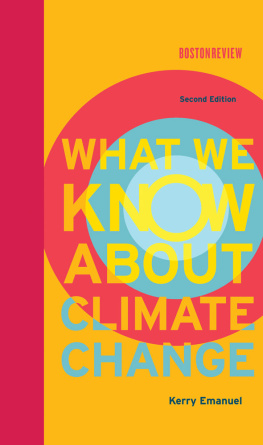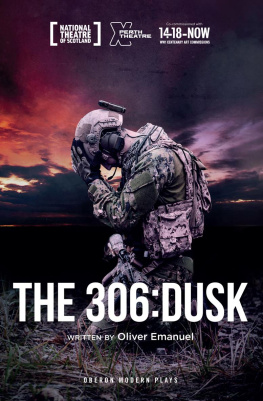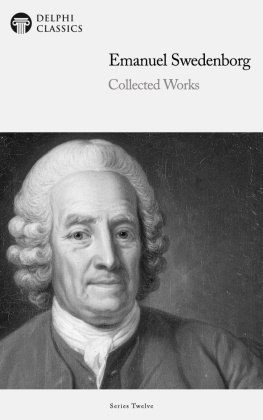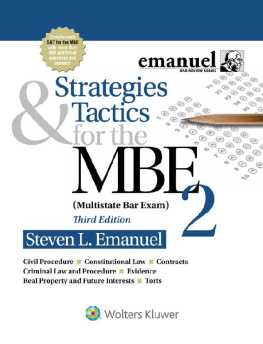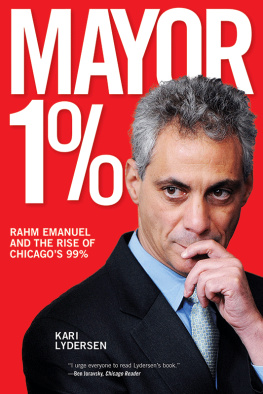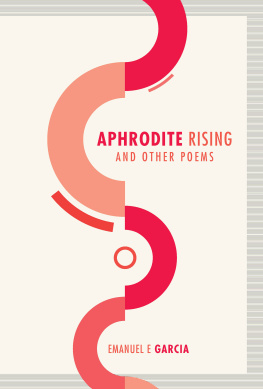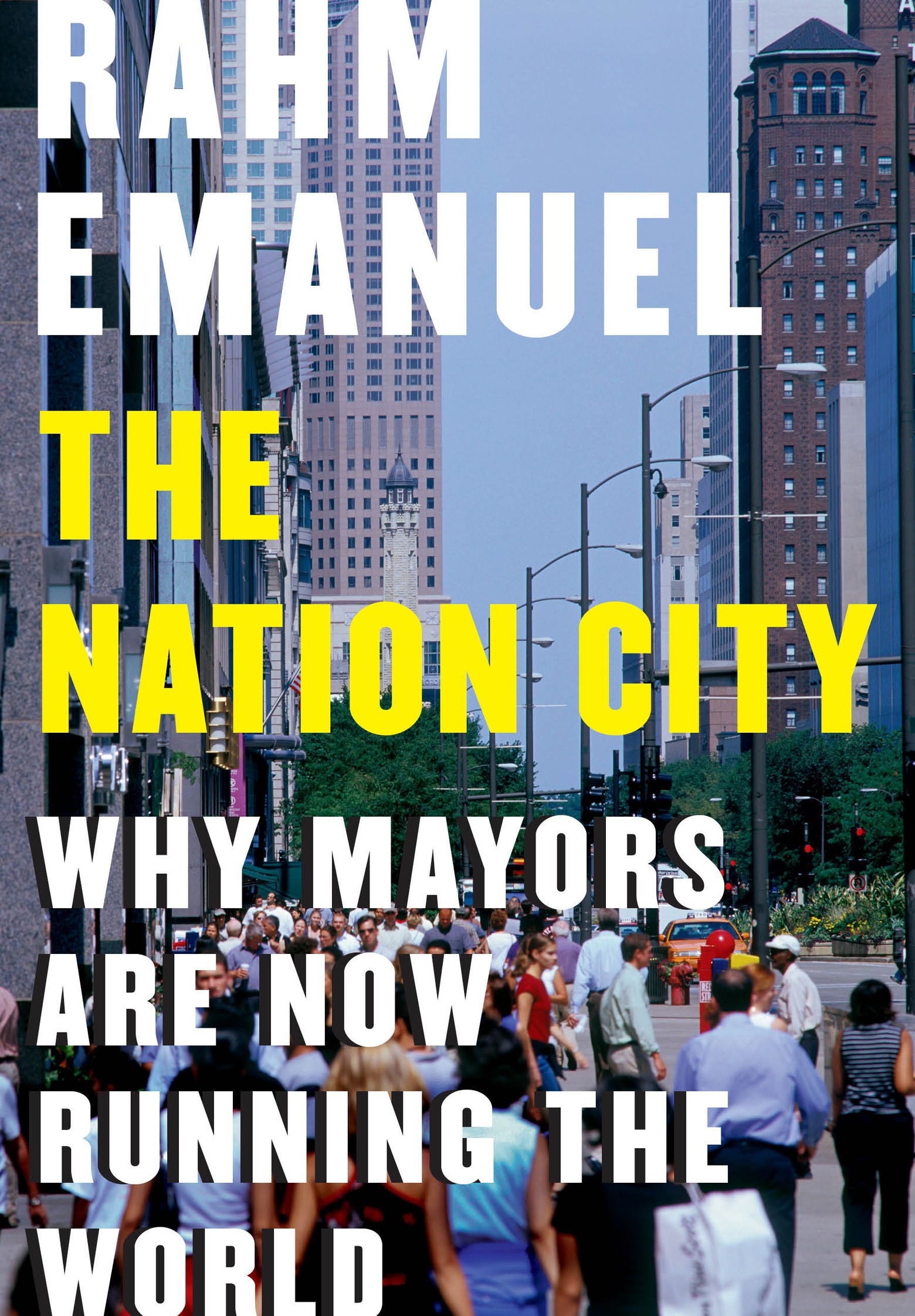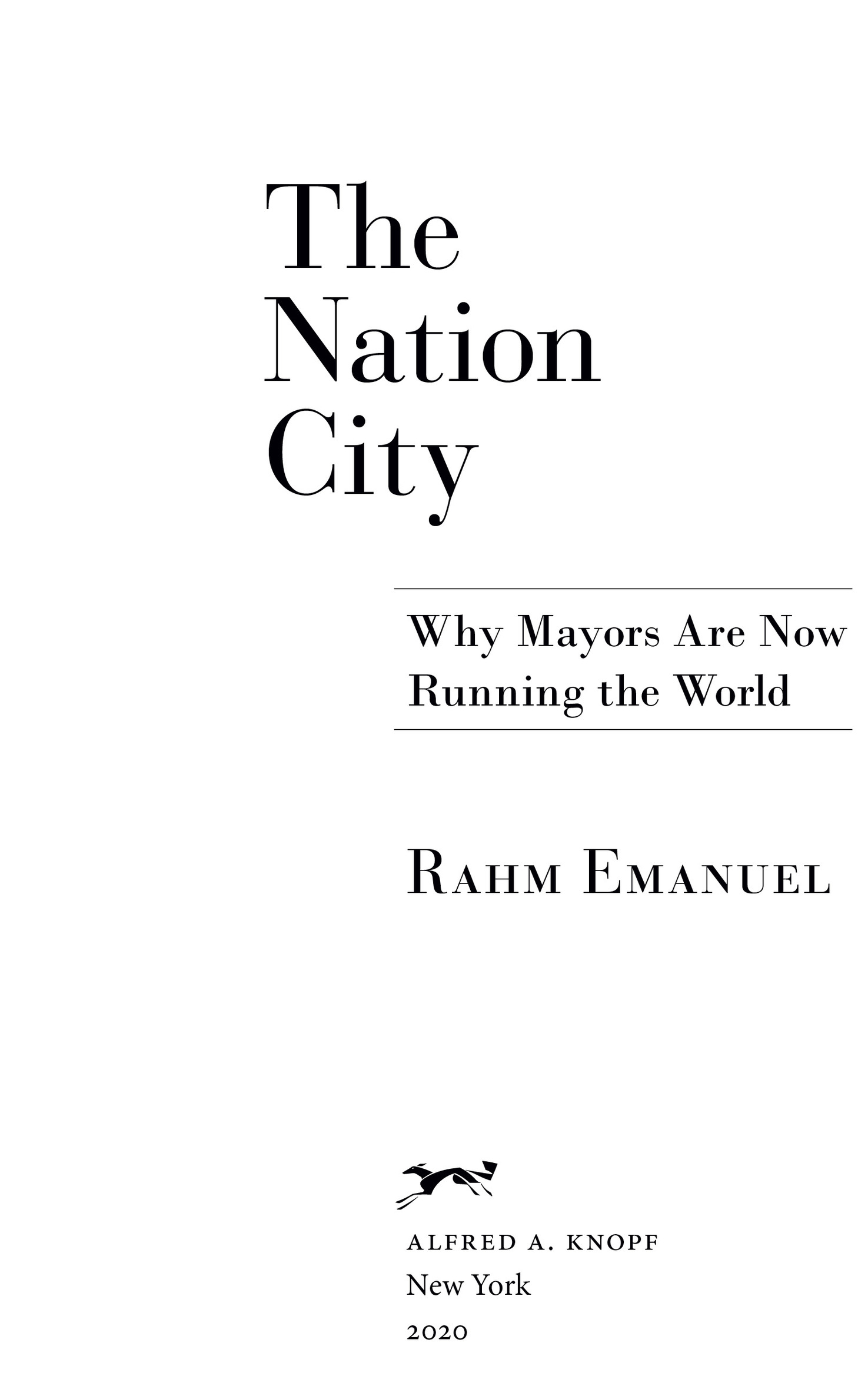Contents
Landmarks
Print Page List
THIS IS A BORZOI BOOK
PUBLISHED BY ALFRED A. KNOPF
Copyright 2020 by Rahm Emanuel
All rights reserved. Published in the United States by Alfred A. Knopf, a division of Penguin Random House LLC, New York, and distributed in Canada by Penguin Random House Canada Limited, Toronto.
www.aaknopf.com
Knopf, Borzoi Books, and the colophon are registered trademarks of Penguin Random House LLC.
Cover photograph by Russell Kord/Alamy
Cover design by Chip Kidd
Library of Congress Cataloging-in-Publication Data
Names: Emanuel, Rahm, 1959 author.
Title: The nation city : why mayors are now running the world / Rahm Emanuel.
Description: New York : Alfred A. Knopf, 2020. | Includes bibliographical references.
Identifiers: LCCN 2019024936 (print) | LCCN 2019024937 (ebook) | ISBN 9780525656388 (hardcover) | ISBN 9780525656395 (ebook)
Subjects: LCSH : MayorsUnited States. | Municipal governmentUnited States. | Municipal servicesUnited StatesManagement. | Political leadershipUnited States. | Government accountabilityUnited States. | United StatesPolitics and government21st century.
Classification: LCC JS 356 . E 63 2020 (print) | LCC JS 356 (ebook) | DDC 352.23/2160973dc23
LC record available at https://lccn.loc.gov/2019024936
LC ebook record available at https://lccn.loc.gov/2019024937
Ebook ISBN9780525656395
v5.4
ep
In memory of Dr. Benjamin Emanuel,
my father, my friend, my mentor
For Amy, Zachariah, Ilana, and Leah
I strongly believe being mayor is the public post in which you have the greatest opportunity to change peoples lives for the better.
EDUARDO PAES , former mayor of Rio de Janeiro
Contents
Introduction
On an early morning in the fall of 1917, Herman Smulevitz hurriedly kissed his mother and then slipped onto a ship docked at a port on the Black Sea. He was ten years old. He would never see his mother again.
World War I was nearing its end and Russia was in turmoil, in the midst of a revolution that would soon lead to a civil war. The country, and vast parts of eastern Europe, were swept up in what would become the third wave of devastating pogromsthe organized massacres of Jews that had been periodically ravaging this part of the world for more than a century. This last wave was the most savage of them all. Anti-Semitic mobs, stirred into a frenzy by the chaos in Russia, raped and pillaged and murdered Jews in the former Polish-Lithuanian lands within Russian borders, known as the Pale of Settlement, where Herman and his mother lived.
Hermans mother had come to the stark conclusion that the only chance of survival her son had was to flee to the United States. She was most likely correct: There is no record of her existence after she told her son goodbye that day.
I am eternally grateful and indebted to her for her sacrifice and for the love she had for her son. Herman Smulevitz was my grandfather.
Herman boarded that boat by himself, a stowaway. He had with him only a few useless coins in his pockets and a note with the name of his father, who had abandoned his family and left for the U.S. after Herman was born, and the word Indiana written on it. Weeks later, Herman landed at Ellis Island in New York City, that great gateway of hope and renewed dreams for so many like him, and made his way to a small town in Indiana. There he somehow found his fathers house. But when he arrived at the front doorunable to speak English, dirty, and probably wearing the same tattered clothes hed had on since the day he left Russiahis new stepmother shut the door in his face, turning him away. With nowhere else to go, Herman traveled to Chicago, where he found an uncle who worked on Maxwell Street, a gateway neighborhood for immigrants on the Near West Side of the city. It was there that my grandfather began to seize his opportunity for a new life.
My grandfathers formal education ended in the fifth grade, but he sat at the kitchen table every morning before breakfast and forced himself to read newspapers and books, teaching himself to speak English and learning about the world. He started earning a wage as a young teen, jumping from one odd job to the next, sweeping floors or delivering goods on foot. He grew quickly and grandly, exiting his teenage years as a six-foot-three, 230-pound man. He began to box. He fought for prize money all over the Midwest, though he was denied the chance to fight for the bigger purses offered in the South because of his Jewish surname. He had huge hands, with fingers like big Polish sausages, as my brother Ezekiel always described them. He later found work in lumberyards and steel mills. He butchered meat. He was a union man through and through, and would become a staunch Franklin Delano Roosevelt Democrat. His longest-serving job was as a deliveryman for Scandinavian Meat. He was charismatic and loud and profane, a big presence, and not just physically. My two brothers and I nicknamed him Big Banger, which, when we said it, sounded like Big Bangah. He was a tough, hard man, a true laborer, but also a people person. Sometimes he would take my brothers and me with him on his deliveries. Hed barge into a store and shake the hands and slap the backs of everyone he saw. He knew everyones name, it seemed, and everyone knew his. Later in his life he would help build a community synagogue on Kedzie Avenue. He eventually moved to North Lawndale, on the old West Side of Chicago, then known as the vest side to his fellow eastern European Jews who lived there.
At a dance one night in Douglas Park in the mid-1920s, Herman met a woman named Sophie Lampert. She had her own remarkable immigration story, having only recently escaped from Moldova, a part of Romania, on a ship with her two sisters. Herman and Sophie eventually got married and had three daughters and two sons. One of those daughters was named Marsha. She is my mother.
Marsha became a radiologist technician at Mount Sinai Hospital in the North Lawndale community. There she met a man named Benjamin Emanuel, a pediatrician who worked at the hospital. His father, Ezekiel Auerbach, had been a pharmacist in Israel. When the family lived in Israel, Benjamins brother, Manuel, was struck in the leg by a bullet while attending a protest in Jerusalem in 1933. He died a few weeks later from an infection. Soon after, the Auerbachs changed their surname to Emanuel in his honor.
Benjamin and Marsha married and had three sonsEzekiel (Zeke), and then me, and then Ariel (Ari)and later adopted a daughter named Shoshana. We grew up in a series of different apartments in Chicago, starting in neighborhoods with low rents and a mix of immigrants, Jews and Catholics and poor whites who had migrated north from southern Appalachia. We fled one of those apartmentsa crumbling flat with leaky faucets and peeling paintbecause one night my mother found a rat sitting next to me in my crib. (We moved to Wilmette when I was in the fifth grade. I would return to the cityto Cornelia Avenue in Wrigleyvilleafter graduating from college in 1982.)
My father coupled his hospital job with a private practice, and he worked seventy hours a week seeing a range of patients, from those so poor that he provided them with free treatment to the sons and daughters of famous ballplayers on the Chicago Cubs. But he always made time for his kids. His favorite game to play with us was chess. He never took it easy on us, never let us win. He encouraged us to think three moves ahead and always to imagine our opponents response to our potential moves.

